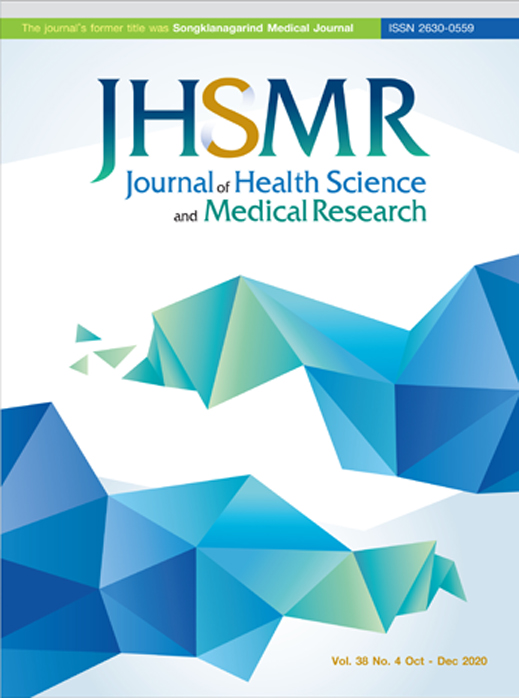Comparison of Immunohistochemistry and Conventional Stains for Helicobacter Pylori Detection in Gastric Biopsies of Patients Receiving Proton Pump Inhibitors
DOI:
https://doi.org/10.31584/jhsmr.2020752Keywords:
conventional stains, H. pylori, immunohistochemistry, proton pump inhibitorsAbstract
Objective: To evaluate the diagnostic performance of different staining methods for Helicobacter pylori (H. pylori) in patients treated with proton pump inhibitors (PPI)
Material and Methods: This is a retrospective study involving 75 gastric biopsies from patients with and without PPI therapy between October 2018 and September 2019. Slides were stained with hematoxylin and eosin (H&E); Giemsa and immunohistochemical staining (IHC) was done using polyclonal anti-H. pylori antibodies. Statistical analysis was performed to determine any association between the results of different staining methods and PPI consumption. Sensitivity, specificity and positive-negative predictive values of H&E and Giemsa stains were calculated.
Results: Overall, H. pylori infection was detected in 33.3% of patients using IHC, 26.7% using H&E, and 28.0% via Giemsa staining. A strong correlation was found between PPI consumption and low H. pylori density detected via IHC (p-value=0.015) but not using H&E and Giemsa staining. The sensitivity of H&E and Giemsa was markedly reduced as a result of PPI consumption (57.1% to 18.2% vs. 85.7% to 27.3%, respectively).
Conclusion: Identification of H. pylori using IHC in patients treated with PPI was superior to H&E and Giemsa stains. Both H&E and Giemsa stains showed a marked decrease in sensitivity in patients receiving PPI. The results indicate that IHC should be performed in patients with PPI therapy instead of H&E or Giemsa stains, and PPI should be discontinued for at least 14 days before the performance of endoscopy.
References
Go MF. Review article: natural history and epidemiology of Helicobacter pylori infection. Aliment Pharmacol Ther 2002;16: 3-15.
Marshall B, Adams PC. Helicobacter pylori: a nobel pursuit? Can J Gastroenterol 2008; 22:895–89.
Garg B, Sandhu V, Sood N, Sood A, Malhotra V. Histopathological analysis of chronic gastritis and correlation of pathological features with each other and with endoscopic findings. Pol J Pathol 2012;3:172-8.
Mizoguchi H, Fujioka T, Kishi K, Nishizono A, Kodama R, Nasu M. Diversity in protein synthesis and viability of Helicobacter pylori coccoid forms in response to various stimuli. Infect Immun 1988;66:5555-60.
Dhakhwa R, Acharya IL, Shresta HG. Histopathologic study of chronic antral gastritis. J Nepal Health Res Counc 2012;10: 57-60.
Malfertheiner P, Megraud F, O’Morain CA, Gisbert JP, Kuipers EJ, Axon AT, et al. Management of Helicobacter pylori infection-The Maastricht V/Florence Consensus Report. Gut 2017;66:6–30.
Saniee P, Shahreza S, Siavoshi F. Negative effect of proton pump inhibitors (PPIs) on Helicobacter pylori growth, morphology, and urease test and recovery after PPI removal-an in vitro study. Helicobacter 2016;21:143–52.
Gatta L, Vakil N, Ricci C, Osborn JF, Tampieri A, Perna F, et al. Effect of proton pump inhibitors and antacid therapy on 13C urea breath tests and stool test for Helicobacter pylori infection. Am J Gastroenterol 2004;99:823–9.
Graham DY, Genta R, Evans DG, Reddy R, Clarridge JE, Olson CA, et al. Helicobacter pylori does not migrate from the antrum to the corpus in response to omeprazole. Am J Gastroenterol 1996;91:2120–4.
Suzuki M, Suzuki H, Kitahora T, Miyazawa M, Nagahashi S, Suzuki K, et al. Treatment with a proton pump inhibitor promotes corpus gastritis in patients with Helicobacter pyloriinfected antrum-predominant gastritis. Aliment Pharmacol Ther 2002;16:159–65.
Graham DY, Opekun AR, Hammoud F, Yamaoka Y, Reddy R, Osato MS, et al. Studies regarding the mechanism of false negative urea breath tests with proton pump inhibitors. Am J Gastroenterol 2003;98:1005–9.
Yup LJ, Nayoung K. Diagnosis of Helicobacter pylori by invasive test: histology. Ann Transl Med 2015;3:1-8.
Dixon MF, Genta RM, Yardley JH, Correa P. Classification and grading of gastritis. The updated Sydney System. International Workshop on the Histopathology of Gastritis, Houston 1994. Am J Surg Pathol 1996;20:1161-81.
Pérez-Pérez GI, Taylor DN, Bodhidatta L, Wongsrichanalai J, Baze WB, Dunn BE, et al. Seroprevalence of Helicobacter pylori infections in Thailand. J Infect Dis 1990;161:1237-41.
Chinprasatsak S, Wilairatana P, Visalwadi P, Sanguansri P, Batara L, Kityaporn D, et al. Helicobacter pylori prevalence in northeastern Thailand. Southeast Asian J Trop Med Public Health 1993;24:734-41.
Tan HJ, Goh KL. Changing epidemiology of Helicobacter pylori in Asia. J Dig Dis 2008;9:186-9.
Hooi JKY, Lai WY, Ng WK, Suen MMY, Underwood FE, Tanyingoh D, et al. Global prevalence of Helicobacter pylori infection: systematic review and meta-analysis. Gastroenterology 2017;153:420-9.
Patnayak R, Reddy V, Jena A, Rukmangadha N, Parthasarathy S, Reddy MK. Utility of immunohistochemistry in demonstrating Helicobacter pylori. OGH Reports 2015;1:1-4.
Yup LJ, Nayoung K. Diagnosis of Helicobacter pylori by invasive test: histology. Ann Transl Med 2015;3:1-8.
Lee HC, Huang TC, Lin CL, Chen KY, Wang CK, Wu DC. Performance of routine Helicobacter pylori invasive tests in patients with dyspepsia. Gastroenterol Res Pract 2013; 2013:184806.
Iwahi T, Satoh H, Nakao M, Iwasaki T, Yamazaki T, Kubo K, et al. Lansoprazole, a novel benzimidazole proton pump inhibitor, and its related compounds have selective activity against Helicobacter pylori. Antimicrob Agents Chemother 1991;35:490-6.
Weil J, Bell GD, Powell K, Morden A, Harrison G, Gant PW, et al. Omeprazole and Helicobacter pylori: temporary suppression rather than true eradication. Aliment Pharmacol Ther 1991;5:309-13.
Andersen LP, Dorland A, Karacan H, Colding H, Nilsson HO, Wadström T, et al. Possible clinical importance of the trans formation of Helicobacter pylori into coccoid forms. Scand J Gastroenterol 2000;35:897-903
Nakao M, Tada M, Tsuchimori K, Uekata M. Antibacterial properties of lansoprazole alone and in combination with antimicrobial agents against Helicobacter pylori. Eur J Clin Microbiol Infect Dis 1995;14:391-9.
Nakao M, Malfertheiner P. Growth inhibitory and bactericidal activities of lansoprazole compared with those of omeprazole and pantoprazole against Helicobacter pylori. Helicobacter 1998;3:21-7.
Roberts SJ, Bateman DN. Prescribing of antacids and ulcerhealing drugs in primary care in the north of England. Aliment Pharmacol Ther 1995;9:137-43.
Malfertheiner P, Megraud F, O’Morain C, Bazzoli F, El-Omar E, Graham D, et al. Current concepts in the management of Helicobacter pylori infection: the Maastricht III Consensus Report. Gut 2007;56:772-81.
























